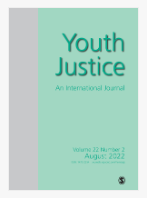
In September 2022, academic journal Youth Justice published a new article on the use of restorative justice and restorative practices with young people in Ireland. The article, entitled ‘Challenges in the Future of Restorative Youth Justice in Ireland: Minimising Intervention, Maximising Participation’, is open access, meaning that it can be downloaded freely online.
Written by Dr. Ian Marder (Maynooth University, School of Law and Criminology) and Dr. Louise Forde (Brunel University, Brunel Law School), the paper analyses the role of restorative justice and restorative practices in Irish youth justice to date, and applies the international legal framework and evidence from research around the world to the Government’s plans under the new Youth justice Strategy (2021-2027). This includes provisions to expand the involvement of victims in restorative processes with young people who have committed a crime, increase the use of family conferences, and train youth justice professionals in restorative practices.
The authors argue that policymakers and professionals must design these reforms in line with two key findings from the international literature. First, youth justice is most effective when the intensity of the process and outcomes are as low as possible. A high intensity process or severe outcomes risk entrenching a young person in criminality, rather than (as is often assumed) deterring them from future offending. As such, restorative justice processes should limit their intensity where possible, and be used primarily to divert young people form more intensive processes and outcomes.
Second, young people are seldom heard from or included in decision-making around youth justice processes that affect them, despite strong evidence that interventions are less likely to be effective if they are experienced as dominating, and more likely to be effective if young people are consulted meaningfully as part of the process. Restorative youth justice, therefore, should be as participatory as possible for the young people involved.
You can download the article free here. You can read further work from Louise on child participation here and here. You can read the Irish Youth Justice Strategy here, and find case studies on the use of restorative justice and restorative practices with young people in Ireland here.
